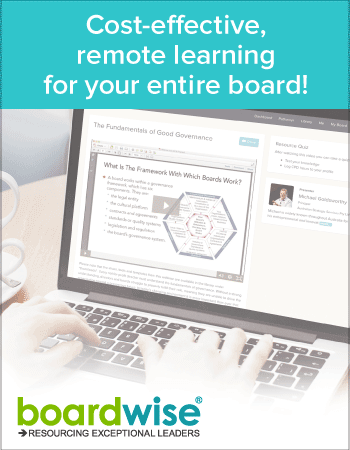board-dynamics
Seat Warmers and Saboteurs – Dealing with Difficult Directors
Published: October 12, 2015
Read Time: 8 minutes

Communication breakdown and relationship failure within a board are a challenge for many organisations. Some of the stories we hear most commonly from directors at Better Boards are related to challenging relationships within the boardroom. Governance is not a solitary activity – it involves sharing and debating ideas, but also cooperation. The capacity of the board to come together for decision-making can have a direct impact on its effectiveness.
Sometimes these types of conflict are fleeting, unforeseeable or just a blowing-off of steam, but in other more serious instances, they are the result of an underlying dysfunction in the group such as a poor board culture, or simply an individual board member who is a bad fit for the board or for the role.
Yet disruptive directors and a dysfunctional board don’t have to be a death sentence for your organisation. In this article I will address how these conflicts can arise and ways to defuse them, but most importantly, some preventative measures you can put in place in your organisation to ensure your board remains healthy and stable.
The Politics of Personality
Sometimes conflict on a board comes down to a simple clash of personalities or differing opinions – confident, successful and influential people can be a major asset on a board, but sometimes they may also have a specific agenda to push or no interest in listening to or respecting the opinions of others.
In other cases an individual trustee sabotages the good work of the whole group, by committing fraud, or an abuse of power or by exhibiting plain old bad behaviour. In these situations, it is important you and that the other directors have the skills and fortitude to regain control from these saboteurs and protect the organisation, its stakeholders and its reputation, from harm.
Minor conflict or disagreement can sometimes be solved by sitting the perpetrator down for a frank conversation about their actions but if your board is experiencing major conflict affecting your organisation as a whole, or a crime has been committed then seeking outside assistance or advice and pursuing more serious alternatives may be wise.
Research from the BDO Not-for-Profit Fraud Survey 2014 found that 54% of respondents had not reported fraud to the authorities due to fears about the impact it would have on future opportunities for the organisation.1 However, this short-term thinking can have a multitude of long-term negative effects for your organisation, not least by creating a culture that appears to condone misconduct. In most cases, a seriously bad trustee will need to be removed in order for the organisation to recover.
Make yourself aware of the legal avenues you can take in order to remove this trustee. Become familiar with your organisation’s constitution and seek legal advice and advice from government regulators to make yourself aware of your options.
Board culture
Whilst it is important for board members to have a solid command of key governance skills and capabilities, it is also vital that the board as a whole is able to utilise these skills in concert for the benefit of the organisation. The principles that inspire your board’s culture should be shared and celebrated generously, as the culture of the board is highly influential on the culture of the organisation as a whole.
Board culture should be positive and proactive. Every trustee should feel they have something to contribute and be aware of and involved in all aspects of the board’s duties. Gone are the days when only the treasurer needed to worry about the organisation’s finances – it is the responsibility of all directors to understand the board’s finances as all directors share liability for the organisation’s actions.
Recruiting skilled, enthusiastic and engaged directors can be a real challenge for many non-profit organisations, and in some situations this means that unengaged, under-skilled or uncommitted people are signed on as directors. These seat-warmers are disengaged and disruptive to the work of the board. For an organisation to truly succeed and thrive, directors should understand the serious commitment that the role involves.
Speaking at the Better Boards Conference 2014, Robert Gordon of Board Accord addressed the value of articulating your board and organisation’s culture, values, history, purpose and goals in order to maximise board participation. He advocated communicating these as part of the board selection process to ensure that prospective directors are aware of these from the outset.
Tips for Maintaining a Cohesive and Cooperative Board
Board Succession and Renewal
Ensuring that a robust succession and renewal plan is in place for your board can prevent power vacuums or the employment of under-skilled directors or seat warmers who treat board meetings like social events. The challenge of attracting new directors is a common challenge for non-profit organisations but securing a desirable candidate is only one facet of the process of renewing a board’s membership.
A robust induction plan for new directors is also a vital process of board renewal. Joining a board is like assuming any new role; it takes time to settle in even if you have previously held a similar position. As David Fishel puts it in The Book of the Board, putting new directors through an effective induction program “increases their value to the organisation, and minimises the risk of feeling like an outsider for months after they have joined”2.
Use the Constitution to manage board succession and expectations
A proactive and pre-emptive method for managing your board’s makeup is to build board guidelines into your organisation’s Constitution. At the Better Boards Conference 2015, Natalie Elms – a PhD researcher from the Queensland University of Technology – outlined the value of the constitution as helpful tool in ensuring you have the right directors on your board, and removing any who are lacking commitment.
In addition to providing important legal information about how your organisation is structured, its purpose and reason for being, and how it is to be governed, the Constitution can be used to direct the nature of the organisation’s board. It can be used to direct the size of the board, how new directors will be appointed, whether directors are elected or chosen by the existing board, how long a trustee can serve for and the number of terms.3
Board Policies and Procedures
Just as employees are managed with policies and procedures, such as position descriptions, codes of conduct and key performance indicators, directors should have detailed documents that prescribes the roles and responsibilities of individual directors and the board as a whole. Well-understood and well-used policies and procedures make the difference between a haphazard committee and a professional, strategic and innovative board.
Documentation that formalises governance roles and key board functions provides a resource that can be used to instruct new members, be called upon for clarification and also provide a framework within which under-performing or recalcitrant directors can be managed.
Code of Conduct
As with any employee, directors should be expected to follow certain standards of behaviour in their role on the board. A board code of conduct will help to ensure that expectations are set out up front and that all directors are made aware of these expectations and make a commitment to stand by them. In combination with the organisation’s constitution, the code of conduct can be used to remove disruptive, disrespectful or underperforming directors.
Open and frank conversations about fraud and corruption
Fostering open conversations within the board and between the board and the rest of organisation is a vital process for uncovering assumptions and miscommunication and airing disagreements in constructive way. Carefully discussing an issue such as fraud when developing policies can assist in coming to a cohesive and inclusive decision that when disseminated throughout the organisation will encourage ownership and commitment to the principles. In an article for the Better Boards Newsletter, Trent Dean – Executive Manager of Quality, Safety and Risk at Royal Flying Doctor Service (Qld) – writes that boards should put the topic of fraud up for discussion and “have a clearly visible board position that ensures any substantiated claims of fraud or corruption will be formally addressed, including industrial or criminal action.”4
Continued Board Development
Research suggests that learning in groups or teams can significantly improve the effectiveness of your learning, and group activities are beneficial in building cohesion. Part of making a commitment to an organisation in joining a board, is the commitment to having the most up-to-date skills and knowledge. Regular planning workshops, strategy days, retreats, conferences and courses that are participated in as a team can not only be an enjoyable way to build relationships as a board and improve skills and knowledge but can also assist in developing and practicing cooperation, communication and decision-making as a team.
Conclusion
Difficult directors, saboteurs and seat-warmers are a reality that some organisations face and it can be a tough struggle to rein the board back to a functioning, cohesive and effective body. Dealing with problem directors is best managed with calm and clear communication and with the assistance of robust policies and processes that help the board to be proactive, up-front about its expectations and a champion of cooperation.
-
Fishel, David (2008) The Book of the Board: Effective Governance for non-profit organisations, Second Edition, The Federation Press: Sydney, p. 202. ↩︎
-
Fishel, David (2014) The Book of the Board: Effective Governance for non-profit organisations, Third Edition, The Federation Press: Sydney, p. 138. ↩︎
-
Dean, Trent (2014) Not for Profit, Not for Fraud , Better Boards Newsletter May 2014. ↩︎
Share this Article
Recommended Reading
Recommended Viewing
Author
-
Former Researcher
Better Boards
- About
-
At the time of writing Julia was a writer and researcher at Better Boards. She has a passionate interest in the non-profit sector, particularly its legal and regulatory complexities and she follows all news and developments in this area keenly. Prior to joining Better Boards, Julia served as an intern at Philanthropy Australia. Julia has a Bachelor of Arts from the University of Melbourne, majoring in Political Science and English Literature.
Found this article useful or informative?
Join 5,000+ not-for-profit & for-purpose directors receiving the latest insights on governance and leadership.
Receive a free e-book on improving your board decisions when you subscribe.
Unsubscribe anytime. We care about your privacy - read our Privacy Policy .







